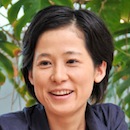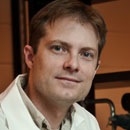Academic Editors
The following people constitute the Editorial Board of Academic Editors for PeerJ. These active academics are the Editors who seek peer reviewers, evaluate their responses, and make editorial decisions on each submission to the journal. Learn more about becoming an Editor.

Jeffrey A Stuart
Associated Professor and Chair of Biological Sciences.
The goal of my research program is to gain a better understanding of the molecular mechanisms underlying longevity. Mitochondria, via their contribution to energy metabolism, cell death pathways, and redox regulated signal transduction pathways, are thought to be important effectors of longevity. We use a comparative approach to study these in mammalian species, including those that are exceptionally long-lived. We are also exploring the ability of small molecules including selective estrogen receptor modulators and phytoestrogens to modulate mitochondrial function and affect aging and longevity.

Katharine L Stuble
Plant Biologist at The Holden Arboretum. Research focuses on the ecological impacts of global climate change and species invasions.
Our lab researches the basic mechanisms underlying the maintenance of diversity within communities, as well as how global change may alter these communities and the services they provide. We focus on two main drivers of global change: climatic warming and species invasions with a particular focus on how global change is altering interspecific interactions ranging from competition to mutualisms.

Yu-Sheng Su
Deputy CTO, Global Graphene Group; previously Assistant Professor, Department of Materials Science and Engineering, National Taiwan University; PhD, The University of Texas at Austin.

Vasanta Subramanian
Vasanta Subramanian is currently an Associate Professor in Vertebrate Developmental Genetics and Stem cell Biology. Her research focus is in three main areas- (1) Polycomb group genes, signalling and embryonic development (2) stem cells and reprogramming and (3) stem cell and transgenic mouse models for neurodegenerative diseases.She is a Fellow of theRoyal Society of Biology.

Sankar Subramanian
Senior Lecturer at the University of the Sunshine Coast, Moreton Bay, Brisbane, Australia; USC Senior Research Fellow; Smithsonian Fellow; Adjunct Research Fellow (Griffith University)
Dr Sankar Subramanian is a Senior Lecturer in Genetics. Sankar joined USC as a Senior Research Fellow in March 2017. Prior to this he worked at the Australian Research Centre for Human Evolution, Griffith University. His research primarily centers around the question of, how does genetic drift influence mutations. Sankar worked on a number of research projects to investigate the interaction between drift and mutations, which include the evolution of codon usage bias in animal genomes, temporal patterns of deleterious mutations in humans and penguins, difference in the allele frequencies of polymorphisms in global human populations. Sankar has developed methods to identify and quantify deleterious mutations in human populations. Dr Subramanian is also interested in estimating rates of mutations and divergence times between species and populations. His research also focuses on studying ancient genomes to understand the past demographic history of vertebrates including ancient penguins, tuatara (a New Zealand reptile), moa (an extinct bird) and ancient humans. Furthermore, he is investigating the population history, mutational load and admixture patterns of modern and ancient Aboriginal Australians. At USC, he has started working on the conservation genomics of Australian Dingoes.

Cédric Sueur
Cédric Sueur is Full Professor at the University of Strasbourg, specializing in the study of animal behavior with a primary focus on the dynamics of social networks and the mechanisms of collective decision-making within social groups. He holds leadership roles in academic programs, serving as co-director of both the Master's program in Ecology, Ecophysiology, and Ethology, and the Master's program in Animal Ethics, highlighting his dedication to advancing knowledge in both ecological and ethical domains. His distinguished contributions to his field have earned him membership in the prestigious Institut Universitaire de France and recognition from the Royal Academy of Science, Letters and Fine Arts of Belgium, where he was honored with an award.

Keiko Sugimoto
Group leader at RIKEN Plant Science Center. Editorial Board Member of Cell Reports, The Plant Cell, Genes to Cells, Plant and Cell Physiology, and Frontiers in Plant Science

Ryan Christopher Sullivan
Associate Professor of Chemistry, and Mechanical Engineering at Carnegie Mellon University, with a courtesy appointment in Civil and Environmental Engineering. He is also a faculty member in the Center for Atmospheric Particle Studies. Hon.B.Sc. in Chemistry from the University of Toronto, Ph.D. in Chemistry from the University of California, San Diego. Before moving to Carnegie Mellon University in 2012 he completed his postdoctoral research in Atmospheric Science at Colorado State University. Recipient of a Faculty Early Career Development (CAREER) award from the National Science Foundation, and the National Academy of Science’s Cozzarelli Prize.
Developing laser-based analytical techniques for real-time analysis of individual aerosol particle composition. These include laser ablation single-particle mass spectrometry, aerosol optical tweezers, and microfluidic devices for ice nucleation research. The multi-phase chemical evolution of biomass burning aerosol from wood smoke is a major current focus. Experimental studies include the alteration of the ice nucleation properties of smoke particles induced by chemical aging; and the activation of photo-labile chlorinated gases from heterogeneous reactions of nitrogen oxides with smoke aerosol. Recently active in evaluating the kinetics and biosafety of catalysts for sustainable ultra-dilute oxidation catalysis.

William J. Sullivan Jr
Associate Professor of Pharmacology & Toxicology, Microbiology & Immunology at Indiana University School of Medicine. Editorial board of Eukaryotic Cell. Counselor for Division AA (Free-Living, Symbiotic and Parasitic Protists), American Society for Microbiology.

Cheng Sun
The Professor of global environmental change, Beijing Normal University. My research focusses on decadal climate variability, including the mechanisms and dynamics underlying the variability and its impacts on global and regional climates. I am also interested in paleoclimatology and reconstructions, and ecosystem response to climate change. I carried out a lot of original studies using observation and proxy data and simulations of earth system models. Specific interests include Atlantic multidecadal variability, Pacific decadal variability, ENSO, North Atlantic Oscillation, Indo-Pacific warm pool variability, and their impacts on global/regional rainfall and temperature and associated ecosystem responses.

Shao-Chen Sun
Professor of Reproductive Biology at Nanjing Agricultural University. Focused on molecular mechanisms of mammalian oocyte maturation and reprodutive toxiology.

Genlou Sun
Professor of Plant Molecular Genetics and Evolutionary Biology, Editorial Board members of Molecular Breeding, Frontier in Genetics, PLOS ONE, Acta Agronomica Sinica and Diversity

